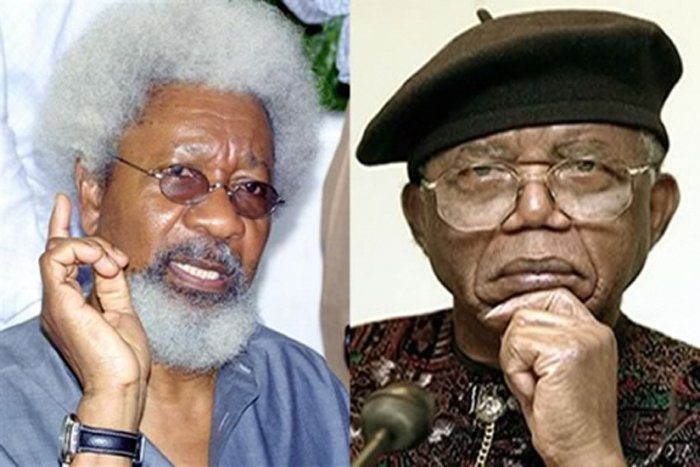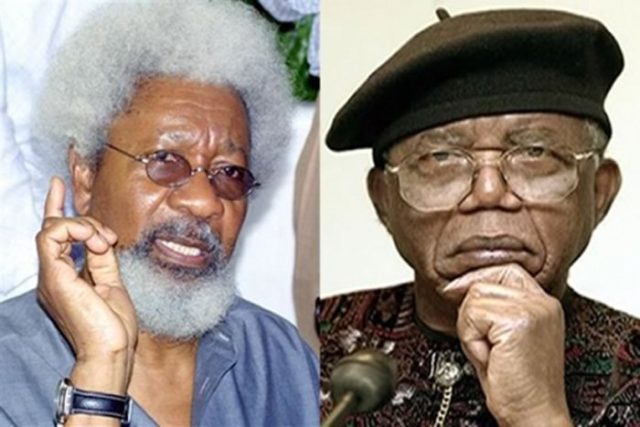Life And People
Achebe Vs Soyinka: Who Is The Greatest? -By Rees Chikwendu

Reno Omokri was again in the limelight of controversy this week with his tweet on the late Chinua Achebe and Wole Soyinka. He sparked a contestation and tirade of abuses on social media among Nigerians with this tweet:
“Between Chinua Achebe and Professor Wole Soyinka, I would give the @NobelPrize for literature to Achebe 100 times out of 100 times. I still don’t understand how Soyinka got it and Achebe did not. I read their books. Achebe’s works are by far the more superior works of literature.”
The stream of invective Nigerians poured on social media also took ethnic coloration – one of the country’s fault lines. It sort of predominantly became a war of words between the Igbo and the Yoruba – the two greatest Nigerian ethnic nations – and drew the attention of some leading social commentators offline.

It was not the first time Mr. Omokri, the former spokesperson of the former Nigerian president, Goodluck Jonathan, had rocked the Nigerian social media discourse table. Some of his other controversial tweets bother on subjects such as homosexuals, feminism, religion, politics, wealth, etc. Arguably, Reno has earned himself as one of the foremost Nigerian social media table shakers.
Looking at the bone of contention, was it really necessary to compare Achebe and Soyinka or to question who deserved the Nobel Prize more? In my opinion, that was not necessary, because the two are literary gods in their own right. Moreover, Achebe and Soyinka do not have the same style of writing, which is a profound reason why anyone who appreciates literature would value their works for what they represent, individually!
Digging into the Nobel Prize archives and content analyzing the statements made on the 1986 Nobel Prize in Literature, it was clear for which reason Professor Soyinka was awarded the prize. Of course, I am not saying there could not have been some political influences on the deservedness, after all, every aspect of human achievements is politics. But according to the Nobel Prize in Literature, 1986, Soyinka’s through his works have a wide cultural perspective and with poetic overtones fashions the drama of existence.
Right there we could see the sub-genre of literature appreciated at that time in history by those who made the selection for the winner of the prize. Soyinka’s works in literature were considered for their evocative and poetic intensified dictions. He was at this moment in the history of literature characterized as one of the finest poetical playwrights. Some of Soyinka’s plays have similar elements of Elizabethan drama, and the key figures mentioned in them possess traits that direct thoughts to the Dionysian, the Apollonian and the Promethean in the European tradition. These were elements appreciated by those who made the winner selection.
Undisputably, Soyinka is the center of force in African drama with poetical elements. His style of prose is aggressive and poetic. Linguistically, Soyinka possesses a prolific store of words and expressions. Just watch the old man in dialogue and be amazed in his wittiness and subtle poetry in every word he drops. They are not unintelligible expressions like those of Patrick Obahiagbon (not even comparable). Professor Soyinka has a sparkling vitality of words which are most times complex but same time coherent.
On the other hand, Chinua Achebe, without the Nobel Prize, is the father of contemporary African literature. He is the god of modern African literature, and Chimamanda Ngozi Adichie and many others, are following in his footsteps. Achebe is the only African writer whose works are recognized most in the world. Things Fall Apart, the first novel written by the late Nigerian literary icon, Chinua Achebe, made the list of 12 “Greatest Books Ever Written” compiled by Encyclopedia Britannica. Recently, it made the BBC’s ‘100 stories that shaped the World. No African writer has ever come close to these achievements.
Achebe’s style of writing is more of narrative prose filled with realism and tragedy, and sometimes with elements of poetry. Without much embellishment, he narrates with clarity of objective, unlike Soyinka’s use of complex diction and strong poetical elements. Anyone who reads Achebe’s books has to do so for their own literary values not whether it deserved the Nobel Prize. Of course, Achebe’s works deserve the Nobel Prize even posthumously. But knowing what his works stand for it is unthinkable to expect them to receive the Nobel Prize.
In the words of Mmiri Chika, Achebe’s works are like poison in the heart of European colonial powers. His words and ideas are like a spear thrown to those who believe Africans are sub-beings. He made those who promoted colonialism to see how they destroyed African civilization and pristine ways. So, knowing these, no one in his right mind would expect the same people his works demolish their colonial institutions to recognize him with the Nobel Prize.
Personally, I value the light these two sons of Africa through their works has shown to the world. And I have used both of them in presentations as the central forces of modern African literature (prose of narrative vs. prose of poetry). The Nobel Prize cannot be used to decide the superiority of their works.

















